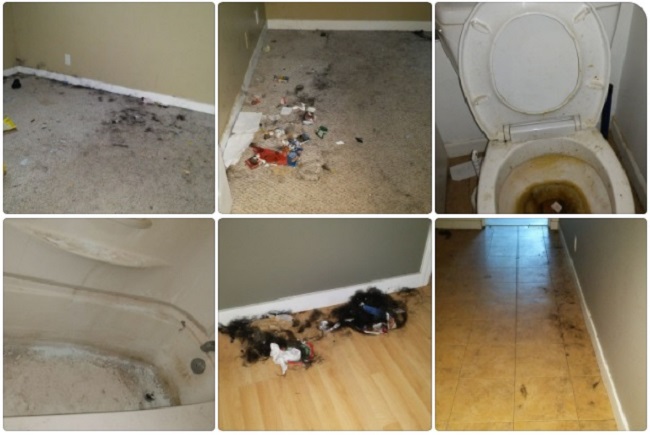WARNING: Disturbing photos below.

CORRECTION: A previous version of this story quoted the landlord as saying she had to issue three eviction notices. In fact, they are legally required to give a 10-day notice. A previous version also said that the home was located in Langley. It is, in fact, located in Nanaimo.
B.C.’s NDP government has made several changes in recent months to protect the rights of tenants and targeting bad landlords.
But what about landlords who have bad tenants?
That’s the question being asked by one Nanimo homeowner after a months-long encounter with what she describes as the “tenant from hell,” and a provincial system she said left her family with no rights.
LISTEN: Are landlord rights being neglected in the housing debate?
Tabitha Oakley and her husband are both schoolteachers in Nanaimo. They have three kids, and recently bought a home with a suite in the basement.
WATCH: Privacy Commissioner warns some landlords asking for too much information

She said having the suite as a mortgage helper was the only way they could afford to buy in this market.
The problems started with their second tenant, Oakley said.
“He came with a dog, and we weren’t entirely certain if we wanted a dog. Things were great in the beginning, then it just steadily went downhill,” she told CKNW’s The Jon McComb Show.
The tenant, a 20-year-old man, stopped cleaning his unit, then eventually stopped paying rent entirely in December 2016, coming up with increasingly elaborate excuses, she said.
“Some of them were crazy. He told us one time he had a heart attack and he couldn’t pay. Another time he had a vet bill that he had to pay so he wasn’t able to pay rent, he had a friend who had overdosed, so that month he was too upset to work.”
They eventually began proceedings to evict him, but Oakley said their understanding is it would take months.
WATCH: New rules for B.C. renters

“We had to show that we had given at least three notices over a six-month period for not paying rent or having rent paid late,” she said.
On that point, Greg Steves, Assistant Deputy Minister of Municipal Affairs and Housing Government says Oakley had it wrong. He says failure to pay rent is grounds for a landlord to kick a tenant out within the month.
“When a tenant isn’t paying rent, that is grounds for proceeding with an eviction, and we would expect the landlord to issue a 10 day notice to end the tenancy,” Steves said.
“And that puts a certain onus on the tenant to, within five days either pay the rent or to dispute that notice. And really the only grounds for disputing that notice would be to provide evidence they have paid the rent.
“I think what we see a lot of times is well meaning landlords who maybe allow for a late payment of rent without issuing that 10-day notice, and it just becomes this habitual pattern of late payment.”
However, Oakley said once the family did serve the tenant with notice, he still wouldn’t leave.
“So what happened then is we put paperwork in for a phone conference hearing for arbitration. That still hasn’t taken place, that’s set for May 3.”
LISTEN: What is the B.C. government doing to protect landlords
The photo below shows the condition of a toilet in Tabitha Oakley’s basement suite after a tenant lived there:
But even that hearing wouldn’t be the end of it. Oakley said she was told that the tenant would likely receive more time if he asked for it at the hearing — and even if he lost in arbitration, he wouldn’t be required to immediately vacate by law.
“Then we apply for what’s called a writ of possession, and our understanding is that is a 90-day wait for a court hearing. If we win that, then we can apply to have a bailiff sent out to physically remove the tenant,” she said.
“So the whole process looks like seven or eight months to get him out of a suite that he hasn’t paid for.”
Things won’t arrive at that point. She said the tenant actually left on his own on Wednesday, but only after police threatened to call an animal cruelty officer to assess his dog.
- Effluent spill at Quesnel, B.C. factory poses no ‘acute risk’: Environment ministry
- Three B.C. men fined, banned from hunting after killing pregnant deer
- B.C. child-killer’s attempt to keep new identity secret draws widespread outrage
- Inquest hears B.C. hostage was lying on her captor before fatal shooting
Oakley said the stress of the ordeal has taken a major toll on her family. As the missed rent payments piled up, her husband was forced to take weekend construction work to help with the mortgage, and she began to look for daycare for her three-month-old child so she could end maternity leave early.
The unit was also trashed, she said.
“A nightmare. I don’t think the toilet has ever been cleaned, or the bathtub. There’s dog hair and garbage all over the suite. It’s terrible.”
Process ‘needs to be improved’
BC NDP MLA Spencer Chandra Herbert, who is chairing the government’s new rental task force, acknowledged that matters can fall out of control when you have a bad tenant.
“We know there are some people who game the system and con landlords again and again and again and are basically getting off, and it’s the same as we know some landlords to do their tenants, so penalties have to be there and it has to be serious,” he said.
He said the government had introduced changes to allow for repeat bad actors to be hit with administrative penalties, but admitted there is still work to do.
He said the government wants to hear from both landlords and tenants about how to better enforce the Residential Tenancy Act, both to make it easier to evict tenants who are damaging property and to censure landlords who are breaking the rules.
“I think the process does need to be improved, clearly that’s something that’s holding some people back from renting out their suites, and the suites need to be rented,” Chandra Herbert said.
In an email to Global News, the Ministry of Municipal Affairs and Housing says it’s important to balance the rights of both landlords and tenants.
“Our government is working hard to improve the rental industry for both tenants and landlords. The Premier recently appointed a Rental Housing Task Force to look at issues facing landlords and tenants with a view to making recommendations for change,” read a statement from the ministry.
It also says the Residential Tenancy Branch has the authority to levy admin penalties in situations where landlords or tenants are “repeatedly and deliberately” contravening the act.












Comments